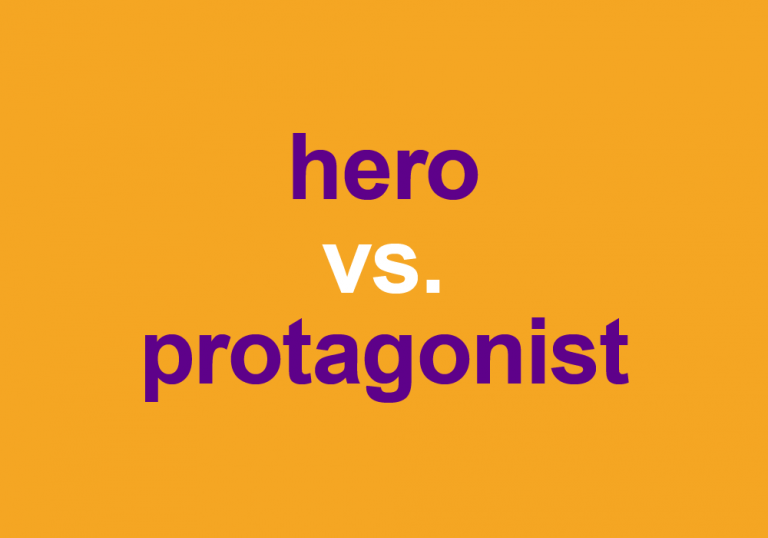“Hero” vs. “Protagonist:” What Is The Difference?

⚡ Quick summary
This article explains the similarities and differences of the terms hero and protagonist and explores their broader literary and cultural usage as well interesting etymology.
Many stories have one thing in common: a brave main character who ends up saving the day. But does slaying the dragon or defusing the bomb make this person a hero or a protagonist? And can the two words be used interchangeably?
The correct answer to both is yes, with the caveat that the words are not always synonymous. Both nouns have multiple definitions and some, but not all, overlap so it depends on the intended meaning. Although protagonist isn’t a synonym for hero when describing a hero sub sandwich, it can be if referring to that courageous dragon killer who saved everyone in the story.
Let’s take a closer look.
What does hero mean?
Hero is a noun that means a brave person who is “noted for courageous acts or nobility of character.” For example: The fire department has deemed her a hero for running into the neighbor’s burning house to try to save the sleeping family.
Hero can also be defined as “a person who, in the opinion of others, has special achievements, abilities, or personal qualities and is regarded as a role model or ideal.” For example: His soccer coach is his personal hero for all that he accomplished in his career before retiring.
But a hero can also refer to a story’s principal male character (and traditionally, heroine for a main female character). Although hero was originally strictly used for a man, it’s important to note that the word is becoming more gender neutral with time and is no longer completely reserved for just males.
In classic mythology, the hero is someone who is deemed as a godlike being and honored as a divinity; a talented warrior-chieftain with special strength; or an immortal being.
And then in a different category from demigods, but still possibly just as important to foodies, a hero can also be a type of sandwich as well as the specific bread used for a hero sandwich.
First recorded in 1605–15, hero originated from the plural Middle English heroes via the singular Latin hērōs and Greek hḗrōs. Some synonyms for hero include icon, idol, and don’t forget, hoagie.
What does protagonist mean?
Like hero, protagonist is a noun that can mean the leading character in a story. However, unlike hero, which historically has only referred to male characters, a protagonist is defined as “a hero or heroine of a drama or other literary work.” For example: throughout much of the play, the protagonist struggles with guilt related to her brother’s death.
A protagonist can also mean someone who is a proponent for or advocate of a political cause. Protagonist can also refer to the leader or principal person in that movement or cause. For example: The new presidential candidate stole the limelight from the usual protagonists with a plan for a universal four-day workweek.
But in the context of an ancient Greek drama, the protagonist is the first actor who plays the main role as well as other characters when the lead is offstage.
The word protagonist was first recorded in 1665–75 and derives from the Greek word prōtagōnistḗs [“an actor who plays the first part”] and is equivalent to prôtos, meaning “first,” and agōnistḗs, meaning “one who contends for a prize; combatant; actor.” In addition to hero or heroine, some other synonyms for protagonist include combatant, idol, advocate, lead, principal, and warrior.
How to use each word
If you are talking about the main character in a story, you can correctly use both hero and protagonist (taking into consideration the lead’s gender and noting that hero originally meant a male character).
But if you’re describing someone who has proven to be universally brave, like doctors on the frontline treating COVID-19 patients without proper personal protective equipment, then the correct word is hero and not protagonist. The same is true for someone who isn’t being praised as courageous but is still a personal role model that a person looks up to. For example: For as long as he can remember, his older brother has been his hero, and he can’t help but idolize him.
Someone who is fighting for a political cause and sparking change can be either a hero or a protagonist — depending on the intended meaning. This activist could be a hero to many for the cause he or she is fighting for, but if you are simply describing this person as an advocate for the cause, then only protagonist can correctly be used. For example: Greta Thunberg is a hero to many for taking a protagonist’s role advocating for climate change at such a young age.
And if you’re talking about your lunch? Sure, you can say that hero sandwich is your hero for saving you from a hungry afternoon.
If you’re still hungry, find out the difference between macaroons and macarons. Or, see if you have a firm grasp on the difference between using figuratively and literally, here!